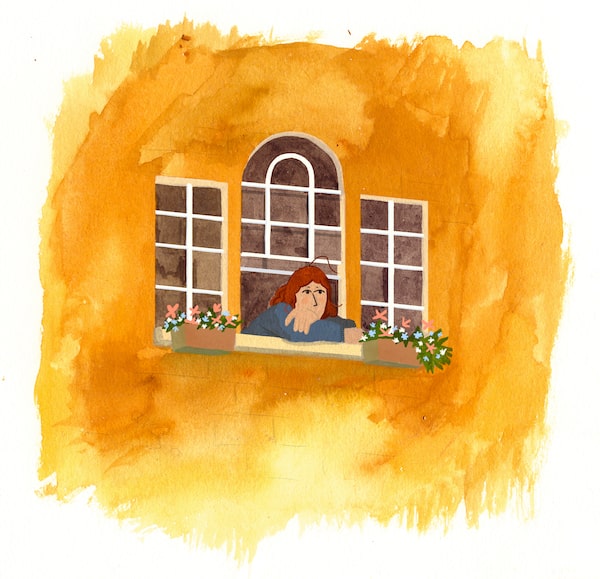
Illustration by Adam De Souza
First Person is a daily personal piece submitted by readers. Have a story to tell? See our guidelines at tgam.ca/essayguide.
I am one of the few foreigners left in Venice. When I walk in the street people assume I speak Italian and are surprised and curious when they find I don’t. They do not think I am a foreigner, because why would a foreigner still be here when the entire country is confined to its home as a virus rages around?
I am a student from the University of Guelph finishing up a bachelors degree in sociology. I left Canada in late January for a semester abroad in Italy, with the intention of remaining in Europe once I graduated. I had quit my job in Canada, said my goodbyes and cut my ties, ready to embrace the adventure to come.
The first few weeks were an exhilarating whirlwind of experiences as I settled into my shared dorm room on the residential island of Giudecca. I made friends with students from across the globe and together we explored the crowded sights, adjusted to a different education system and watched the city’s famous carnival along the edges of the canals.
COVID-19 entered my life in the form of an e-mail. My friends and I were sipping Aperol spritz in a small café as we read that our university had been shut down for the following week. I remember joking about having a week of vacation; the true implications of what was to come were completely lost on me.
It was three days later when the reality hit. I watched my new friend throw all her belongings into a suitcase and take the next flight out of the country. Her parting words: “better locked out of Venice than locked in” caused fear and uncertainty to bubble up inside me. I wondered: “Will I be able to graduate from school?” and “What if everyone leaves and I am alone and trapped in Venice?”
Within a couple of days almost every person I had met, Italian and international, was gone. Departures were abrupt, the ominous sound of suitcase wheels on pavement echoed through the residence courtyard.
Amid the chaos, I turned to my roommate and the calm and rational voices of my parents and together we peeled away the panic. I decided to stay. We all thought it would be two weeks, maybe three and then life would return to normal and our semester would go on as planned.
Things changed so fast, I felt like a fish out of water, flip-flopping between thoughts and ideas every time I read another news update. Every ping of my phone delivered new information that made me uneasy: three cases turned into hundreds then into thousands, then a military lockdown in Milan. The news was confusing because Venice seemed fine. Venice was calm. Venice was quiet. Life was different, but life was continuing.
Then Italy went into a full lockdown and anxiety set in again. I was restricted to Venice, while my friend was now stranded in the Alps at the Austrian border.
Two days later, I joined the few remaining exchange students for pizza but we were ushered out of the shop and told we must only enter two at a time and stand a metre away from each other. Ten minutes later, we were confronted by the police, who told us to go home.
The first time I cried was on my 22nd birthday, a little over two weeks after I received that first e-mail in the café. This is when reality sank in. Every plan I had made had crumbled and almost everyone I had met was gone without a goodbye. It is likely that my university in Venice will not reopen, and for now, I am restricted to a small island in Venice.
However, I am finding the silver lining. Before the complete lockdown, I wandered alone through historic squares and alleys, with time and space to marvel at the beauty uninterrupted. San Marco square, usually full and bustling, was empty.
I am able to see Venician life now that it’s no longer hidden behind a curtain of tourists. In the mornings, it is not uncommon to share a friendly “ciao” with locals who poke their heads out of their apartments as they fling open the shutters to soak in the sun. Long lines often form outside grocery stores and pharmacies, but many Venetians don’t seem to mind. There is no rush, no rush to come nor to go, because all that waits is the return home. Everyone basks in the warm spring sun and chats – while keeping the required metre distance.
In the evenings I can look across the rooftops of Venice to see families gathered as they watch the sunset and sing Italy’s national anthem; a symbol of solidarity and hope.
I am taking advantage of this time to do yoga on the roof, take Italian lessons on YouTube with my roommate, cook on our hotplate as we dance around our small dorm room, and spend afternoons studying and writing on my sunny balcony.
I am glad that I decided to stay. I have learned things that I could have never learned in a lecture hall: how panic is more contagious than a virus, how delicate social stability is and how quickly normalcy can disintegrate.
I have learned how to step back and let go of what my semester abroad could have been and instead focus on the small things that fill me with happiness.
Through this experience I have tested my resilience and adaptability to change. When I left to study abroad two and a half months ago I was told that I would have the experience of a lifetime and I have yet to be disappointed.
Zoë Buratynsky of Hockley Valley, Ont., is living in Venice.